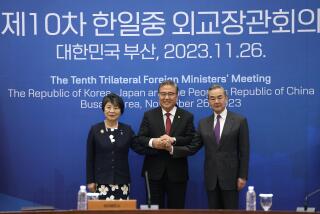Southeast Asian Nations Reach Out to Neighbors
- Share via
MANILA — Declaring the region’s economic crisis over, leaders of the Assn. of Southeast Asian Nations agreed Sunday to increase cooperation with Japan, China and South Korea and to accelerate moves toward the establishment of a common market, similar to the European Union.
ASEAN’s push for integration is significant because, among other reasons, it could include the creation of an Asian Monetary Fund--a proposal Washington vetoed in 1997--and the establishment of a framework to give Southeast Asia and its 500 million people more political and economic clout. The United States, whose imports from Southeast Asia topped $66 billion last year, is the region’s largest customer.
Washington rejected the Asian fund proposal on the grounds that it would undermine economic reforms demanded by the U.S.-dominated International Monetary Fund in exchange for billions of dollars to bail Thailand, Indonesia and South Korea out of recession. The Japanese-backed Asian fund would enhance Tokyo’s influence in the region and heighten its rivalry with China for regional power, analysts said.
The 10 members of ASEAN did not set a timetable for closer integration, other than to announce that they had advanced the target date for eliminating tariffs among member nations to 2010 from 2015. But by including the three northern neighbors--Japan, China and South Korea--as “full-dialogued partners,” they were in effect creating an “East Asian Forum.” Known as ASEAN+3, it could represent a powerful trading and negotiating bloc.
“I see a great deal of possibility in this ASEAN+3 group further expanding and further solidifying as a forum for East Asia as a whole,” President Kim Dae Jung of South Korea told delegates. “It will be able to speak for the region vis-a-vis the North American free trade area, Latin America and the European Union, and engage the organizations in cooperation as well as common competition.”
Premier Zhu Rongji of China, on a two-week tour of four Southeast Asian nations, told the closed-door summit that his country was committed to peace and cooperation and wanted to be a partner in the region’s development. “China,” he said, “cannot develop itself in isolation of the world, and the world will not prosper without China.”
But China demanded further study of a Philippine initiative for a “code of conduct” for the Spratly Islands in the South China Sea, saying negotiations should be handled bilaterally and not through ASEAN. The initiative would have halted “any new occupation” of the oil-rich islands, which are claimed, in whole or part, by China, the Philippines, Vietnam, Brunei, Malaysia and Taiwan. ASEAN members fear that China could enforce its territorial claims militarily in the Spratlys.
At the heart of ASEAN’s moves toward integration is the two years of economic turmoil that derailed a generation of stunning growth and development from Thailand to Indonesia. Thai Foreign Minster Surin Pitsuwan called the crisis “a wake-up call that we cannot live in isolation.”
The region’s finance ministers said in a statement before the summit that the crisis had passed, though they warned that recovery could be set back if U.S. economic growth falters or Japan fails to speed reforms. But, clearly, the recession was neither as deep nor as prolonged as ASEAN had feared initially, economists said. With ASEAN’s economies expected to grow 2% to 3% this year after a 7% contraction in 1998, the Manila-based Economic Development Bank noted last week, “The turnaround has been remarkable.”
Exports are picking up, employment is increasing, and foreign capital is expected to soon start pouring back into the region, economists said. Interest rates and inflation are dropping, consumer confidence is on the rise, and prices and currencies have stabilized.
On the diplomatic front, Japanese Prime Minister Keizo Obuchi met for 15 minutes Sunday with the ruling generals of Myanmar (formerly Burma). He is the first non-ASEAN leader to do so since the military seized control in 1988. Most countries have shunned Myanmar because of alleged human rights abuses and the generals’ unwillingness to consider elections.
ASEAN, whose official language is English and whose secretariat is located in Jakarta, Indonesia, was established in 1967 with U.S. backing as an anti-communist bloc. Its original membership--Indonesia, Malaysia, Singapore, Thailand and the Philippines--has grown to include all 10 regional states, with an annual gross domestic product of $375 billion. Next year’s summit will be in Brunei.
More to Read
Sign up for Essential California
The most important California stories and recommendations in your inbox every morning.
You may occasionally receive promotional content from the Los Angeles Times.











